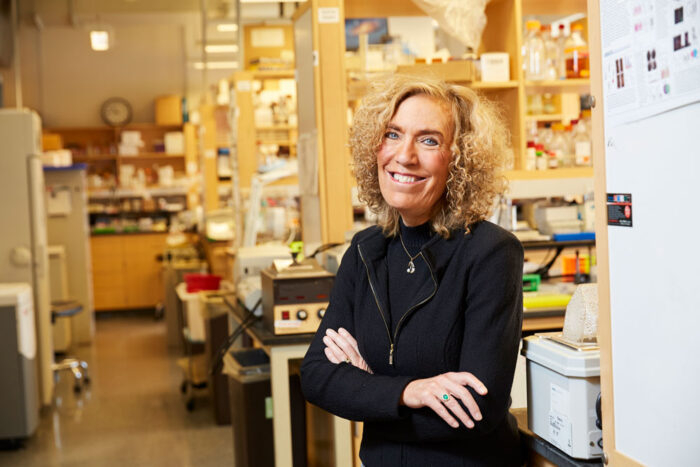
Elaine Fuchs will give the 2019 César Milstein Lecture on Monday 27th January at 11.00am in the LMB’s Max Perutz Lecture Theatre. The title of the lecture is ‘Stem cells in silence and in action’. The event is open to anyone in the local area who is interested in attending.
Elaine is currently the Rebecca C. Lancefield Professor of Mammalian Cell Biology and Development at the Rockefeller University, New York, USA. She has been an Investigator at the Howard Hughes Medical Institute since 1988. She is renowned for her research in skin biology, its stem cells and associated genetic disorders, particularly cancers. Her latest work continues to use skin as a model to investigate how tissue stem cells survive under duress, including in wounds, inflammation and cancer-causing genetic mutations. Her science has particular relevance for how stem cells evade chemotherapy and immunotherapy and lead to relapse of squamous cell carcinomas, one of the most common and life-threatening cancers for which therapeutics are limited.
Elaine received her PhD in Biochemistry from Princeton University. After postdoctoral research at the Massachusetts Institute of Technology, she joined the faculty at the University of Chicago. In 2002, she relocated to the Rockefeller University. She is an elected member of the National Academy of Sciences (USA), The Royal Society (Foreign Member), National Academy of Medicine (USA), American Philosophical Society, European Molecular Biology Organisation (Foreign Member) and the Pontifical Academy of Sciences. She has received numerous awards, honorary doctorates and serves on many committees and boards.
Lecture abstract:
Adult tissue stem cells have the ability to self-renew long term and differentiate into one or more tissues. Many stem cells are used sparingly to replenish cells during normal homeostasis. However, even stem cells that are quiescent must be able to respond quickly to injury in order to fuel rapid tissue regeneration. How stem cells balance self-renewal and differentiation is of fundamental importance to our understanding of normal tissue maintenance and wound repair. The regulatory circuitry governing this normal balancing act must be intricately regulated in normal homeostasis, and then transiently altered to cope with injury responses. Increasing evidence suggests that the mechanism goes awry in inflammation and becomes hijacked in cancers. We use skin as a model to understand how the microenvironment impacts the stem cells and their behavior in health and disease, with the intent to unfold new avenues for therapeutics.
Background information:
The César Milstein Lecture, named in honour of the LMB Nobel Laureate César Milstein, is one of a series of lectures organised by the LMB and given by eminent scientists from around the world. César was born in Argentina in 1927. After completing PhDs in both Buenos Aires and Cambridge, and a brief spell of research back in Argentina, he joined the LMB in 1963 and spent the rest of his life here. He developed an early interest in immunology, and his research concentrated on antibody structure and diversity. In the early 1970′s he and his post-doc Georges Köhler developed the technique to produce monoclonal antibodies, for which they were jointly awarded the 1984 Nobel Prize in Physiology and Medicine. This technique has been used for diagnostics and developed further by LMB colleagues for therapeutic applications, leading to the creation of several MRC spin-out companies. César continued his research on how somatic mutation arises in immunoglobulin genes. He died in Cambridge on 24 March 2002.